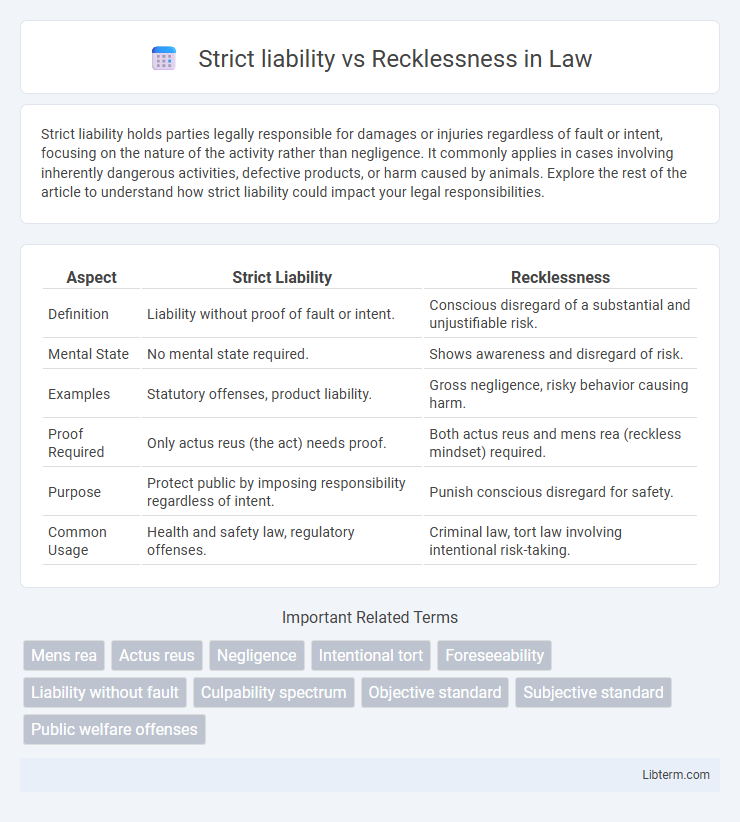Strict liability holds parties legally responsible for damages or injuries regardless of fault or intent, focusing on the nature of the activity rather than negligence. It commonly applies in cases involving inherently dangerous activities, defective products, or harm caused by animals. Explore the rest of the article to understand how strict liability could impact your legal responsibilities.
Table of Comparison
| Aspect | Strict Liability | Recklessness |
|---|---|---|
| Definition | Liability without proof of fault or intent. | Conscious disregard of a substantial and unjustifiable risk. |
| Mental State | No mental state required. | Shows awareness and disregard of risk. |
| Examples | Statutory offenses, product liability. | Gross negligence, risky behavior causing harm. |
| Proof Required | Only actus reus (the act) needs proof. | Both actus reus and mens rea (reckless mindset) required. |
| Purpose | Protect public by imposing responsibility regardless of intent. | Punish conscious disregard for safety. |
| Common Usage | Health and safety law, regulatory offenses. | Criminal law, tort law involving intentional risk-taking. |
Understanding Strict Liability: Definition and Key Features
Strict liability refers to legal responsibility for damages or harm without the need to prove negligence or intent, commonly applied in regulatory offenses and product liability cases. Key features include liability based solely on the act itself, irrespective of the defendant's state of mind or level of care exercised. This contrasts with recklessness, which requires proving conscious disregard of a substantial risk for liability to be established.
Recklessness Explained: Legal Meaning and Implications
Recklessness in law refers to consciously disregarding a substantial and unjustifiable risk that a particular harmful result will occur, demonstrating a gross deviation from standard conduct. Unlike strict liability, which imposes responsibility without fault, recklessness requires a subjective awareness of the danger and a willful disregard of the risk involved. This mental state significantly impacts criminal liability and sentencing, as proving recklessness entails showing the defendant's knowledge and deliberate indifference to potential consequences.
Legal Foundations: Origins of Strict Liability and Recklessness
Strict liability originates from tort law principles where liability is imposed without fault, primarily to promote public safety and encourage higher standards of care in inherently hazardous activities. Recklessness, rooted in criminal law, requires a conscious disregard of a substantial and unjustifiable risk, reflecting a culpable mental state necessary for criminal responsibility. The legal foundations of strict liability emphasize outcome-based responsibility, while recklessness centers on the defendant's subjective awareness and intentional disregard of risk.
Elements Required to Prove Strict Liability
Strict liability requires proving that the defendant committed the prohibited act, known as actus reus, regardless of intent or mental state. Unlike recklessness, which demands a subjective awareness of risk and conscious disregard, strict liability focuses solely on the occurrence of the act itself while omitting mens rea. Elements to prove strict liability typically include establishing the defendant's voluntary action or omission that caused harm or violated a statute designed to protect public welfare.
Essential Components of Recklessness in Law
Recklessness in law requires conscious disregard of a substantial and unjustifiable risk, highlighting the defendant's awareness of the potential harm. Essential components include the subjective knowledge of the risk and the unjustifiable nature of the conduct in light of societal standards. Strict liability, by contrast, imposes responsibility without the need to prove intent or awareness of risk, emphasizing the act itself rather than the mindset.
Key Differences Between Strict Liability and Recklessness
Strict liability holds a party legally responsible for damages regardless of intent or negligence, often applied in cases like product liability or hazardous activities. Recklessness requires proof that the defendant consciously disregarded a substantial risk, showing a willful disregard for safety or legal standards. The key difference lies in intent: strict liability does not require intent or knowledge, whereas recklessness depends on proving a culpable state of mind.
Practical Applications: Common Cases Involving Strict Liability
Strict liability applies in practical scenarios such as product liability, where manufacturers are held accountable for defective goods regardless of fault, ensuring consumer protection. Environmental law frequently enforces strict liability for hazardous waste disposal violations, promoting stringent compliance without proving intent. Other common cases involve statutory offenses like traffic violations, where proof of recklessness is unnecessary to assign responsibility.
Typical Scenarios Where Recklessness Applies
Recklessness typically applies in scenarios where a person consciously disregards a substantial and unjustifiable risk, such as driving under the influence of alcohol or drugs, ignoring safety protocols on construction sites, or discharging a firearm in a crowded area. Unlike strict liability offenses that do not require proof of intent or knowledge, recklessness demands a demonstrable awareness of the risk involved. Courts often examine evidence of the defendant's state of mind to distinguish reckless conduct from negligent or accidental actions.
Legal Defenses for Strict Liability and Recklessness Charges
Strict liability offenses do not require proof of intent or recklessness, limiting legal defenses primarily to demonstrating lack of causation or that the defendant did not commit the actus reus. Recklessness charges allow for broader defenses, including showing absence of awareness of risk or that the defendant took reasonable precautions to avoid harm. Legal strategies for recklessness often involve proving the defendant's state of mind fell short of conscious disregard, whereas strict liability defenses focus on disproving factual elements rather than mental state.
Impact on Sentencing and Civil Damages
Strict liability offenses impose punishment regardless of intent, often resulting in fixed penalties or fines focused on deterrence rather than moral blameworthiness. Recklessness requires proving a conscious disregard of a substantial risk, typically leading to harsher criminal sentences that consider the defendant's state of mind and potential harm caused. In civil damages, strict liability can lead to compensation without fault, while recklessness may increase damages awarded due to punitive elements reflecting the defendant's culpable mental state.
Strict liability Infographic

 libterm.com
libterm.com